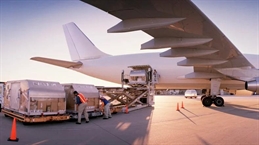
Air capacity on some lanes is tightening, according to the latest report by Flexport, while labor disputes continue to impact major European hubs.
In its freight market update on August 2, the freight forwarder said in particular, due to some flight cancellations on the Transpacific Eastbound (TPEB) trade lane (mainly for ORD and JFK) capacity has tightened compared to the week prior, resulting in increased rate levels.
For Far East Westbound (FEWB) lanes there is still sufficient capacity and rate levels remain the same, it added, but due to Covid and the summer season in AMS, there is a severe shortage of manpower at the cargo terminal, leading to delayed cargo recovery times by 12-36 hours.
HK-Shenzhen cross-border constraints
For South China — Shenzhen, Guangzhou, Dongguan, and Hong Kong — Flexport said the market demand remains soft for both TPEB and FEWB lanes and rate levels have decreased slightly from last week.
"Shenzhen - Hong Kong (SZX-HKG) cross-border operations continue to be affected by Covid surges and a capacity quota reduction," it added, noting that transit times for affected shipments are expected to be prolonged by 2-3 days.
For Europe, Flexport said air cargo demand is "maintaining at lower levels," in line with seasonal fluctuations, and is expected to remain constant through August.
For this lane, the freight forwarder noted that there is ample capacity available to meet current demand and freighter capacity is improving, with better rates and lead times.
For the Americas, the report said export demand is steady from all markets and US airports are "running at a normal pace."
"Capacity is manageable into all regions. European carriers in particular have increased the number of passenger flights for their summer schedules, consequently providing additional belly capacity into the Transatlantic Eastbound (TAEB) trade lane," Flexport added.
Nonetheless, it noted that shipments into Europe could experience additional destination dwell time due to the labor shortages in some western European hubs.
Meanwhile, in terms of ocean shipping, Flexport said spot rates continue to fall with blank sailings on the rise between Asia and North America.
"Blank sailings remain all too common in the market, which carriers are pairing with the low spot rates and demand. Schedule reliability among the alliances remains low and varied," Flexport said.
On-street container dwell, it added, is elevated and inventory on terminals is "reaching max capacity" at some inland locations.
"Containers are ground stacked at the rail as a result of the insufficient chassis supply and-or rail traffic imbalances in Chicago, Dallas, Kansas City, Memphis, Denver, St Louis, Santa Teresa, and Omaha," the forwarder added.
No peak season for Asia-Europe lane
For Asia-Europe, meanwhile, Flexport said demand remains lull.
"There is no peak season and demand has been slowing down," Flexport said. "Supply is still relatively tight due to the large amount of blank sailings, vessel sliding, and port omissions."
It added that the port congestion in Europe, particularly Hamburg and Rotterdam, has reached "critical levels" causing further delays and late return of vessels to Asia.
In terms of rates between Asia-Europe, Flexport said there is continued rate pressure on spot rates due to lower demand.
Nonetheless, space is available but it is impacted by additional blank sailings and delays due to the port congestion in Europe.
For North America-Europe, Flexport said demand for August is expected to be lower due to some European factories closing from late July until mid-August.
"Anticipate a high return of demand beginning in September. Congestion is improving on both the East and West Coast but is still far from normality," the freight forwarder said, adding that rates remain stable at high levels.



